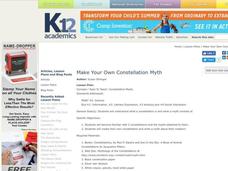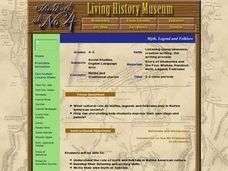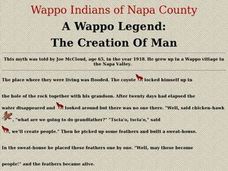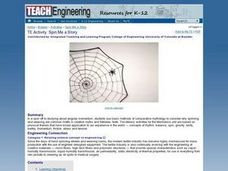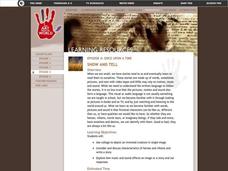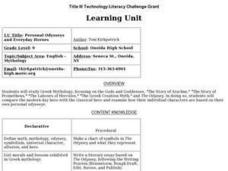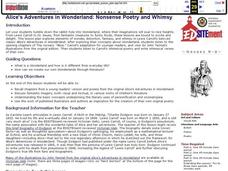Curated OER
Make Your Own Constellation Myth
Students examine constellation myths. In this constellation myth lesson, students read "Orion, the Hunter", "Ursa Major, the Great Bear", and Taurus, the Bull". Students discuss similarities and differences in the 3 myths, create...
Curated OER
Myth, Legend and Folklore
Students examine the role of myths and folklore in the Native American culture. They listen to examples of oral history and write their own. They share their story with the class.
Curated OER
Greek Mythology
Sixth graders investigate the concept of Greek Mythology and conduct research using a variety of resources. They read literature pieces and then write responses to the readings. Students also view a video in order to create the context...
National Endowment for the Humanities
The Metamorphoses and Later Works of Art: A Comparison of Mythic Imagery
In a activity on The Metamorphoses, scholars compare how graphic artists use mythic imagery to represent Ovid's tales. Each group selects a work of art paired with Ovid's version of a myth and compares how both present the story.
Curated OER
Exploring & Creating Mythology
Students read and compare mythological stories from ancient cultures from around the world. In small groups they read a myth and present the storyline and themes to the class, and write an original mythological story of their own...
Curated OER
A Fairy Tale: Italian Folklore
Students work in groups to write an original fairy tale in Italian. They research the components of a fairy tale, compare and contrast fairy tales with myths and follow an outline to write a complete, 15-20 page fairy tale.
Curated OER
A Wappo Legend: The Creation of Man
Third graders read a Wappo creation myth observing the use of symbols or pictures for characters in the story. After discussing the myth, they write their own stories, using pictures for some of the words. They research other creation...
Curated OER
Creature Creation
Students explore the characteristics of dragons as represented in the myths of cultures around the world. They create their own mythical dragons by hybridizing two creatures with desirable traits and writing stories about their creation.
Curated OER
The Search for Shangri-La
What is your idea of paradise? Middle and high schoolers share their visions of paradise on earth in this lesson, in which they view a video segment about Shangri-La. Your high schoolers can discuss and then write about their ideas in a...
Curated OER
A Study Guide for The Phantom of the Opera
Immerse yourself in the beautiful, twisted world of Andrew Lloyd Webber's The Phantom of the Opera. A detailed lesson plan provides important details about the writing, stagecraft, music, and literary elements of the famous musical, as...
Curated OER
Aztec and Mayan Mythology
Sixth graders write myths to show tolerance in creation. They read from both the Aztec and Mayan eras and develop an understanding of the similarities and differences of these two closely related cultures. They track the travels of...
Curated OER
Compare and Contrast Creation Stories
Students compare and contrast creation stories. In this Bible studies lesson, students work in groups to read and summarize creation myths and share with their peers. The class goes on to create a chart to compare and contrast these...
Curated OER
From Fact to Fiction: The Origins of Constellations
Sixth graders investigate the constellations. In this constellations lesson, 6th graders discover where the constellations are located and the myth associated with them. Students create their own myth and make a slide show about stars...
Curated OER
Weather Myths
Fourth graders relate myths to weather phenomenon. They write and illustrated a weather myth and present it to the class.
Huntington Library
Religion & Spirituality - Exploring the California Missions
The California missions were built with the hope of converting the local Native Americans to Catholicism, but exactly how different were their beliefs to begin with? Through analysis of a series of primary source documents, young...
PBS
Exploring the Drive to Create in Frankenstein
Is it hubris that drives the creative process? Is it the desire to be remembered long past death? An interactive asks readers of Mary Shelley's novel Frankenstein and Percy Shelley's poem "Ozymandias" to consider what this wife and...
Curated OER
Prometheus Eulogy
Learners write a eulogy for the mythological character, Prometheus. In this Greek myth lesson, students read a story about Prometheus and view a PowerPoint. Learners discuss the elements of a eulogy and then write one for Prometheus.
Curated OER
Mythology in the ESL Classroom
Learners study myths, mythological figures, and the ancient classics. They develop a sensitivity to the beliefs, values, attitudes, and views of man's development at that time. They illustrate the powers of each god discussed and...
Curated OER
Spin Me a Story
Students examine the motif of spinning and weaving in myths and folktales. They read various myths, complete a WebQuest, develop a mind map of story elements, and write an original "spider" story.
Curated OER
Once Upon a Time
Students examine how music and sound affect their creation of artwork. They view art images online, create three hybrid collage creatures, develop a list of hero characteristics, and write an adventure story for a character they have...
Curated OER
Personal Odysseys and Everyday Heroes
Ninth graders study Greek Mythology, focusing on Gods and Goddesses. They compare the modern day hero with the classical hero and examine how individual characters are based on their own personal odysseys.
John F. Kennedy Center
Folktale Theatre
Introduce your middle schoolers to a performance and movement activity that uses their favorite stories from fairytales and folklore. They practice basic acting skills, create dialogues with a partner, and then as guided practice,...
Curated OER
Alice's Adventures in Wonderland: Nonsense Poetry and Whimsy
Primary learners are introduced to Lewis Carroll's whimsical poetry. They read "The Nursery Alice" Carroll's adaptation for younger readers, view story illustrations, listen to poetry and write whimsical verses of their own about food.
North Carolina Museum of Natural Sciences
Weather Watch Activity Guide: Groundhog Day
Exactly what do groundhogs know about weather? Not as much as your science students will after completing these lessons and activities that cover everything from the earth's rotation and the creation of shadows, to cloud...


